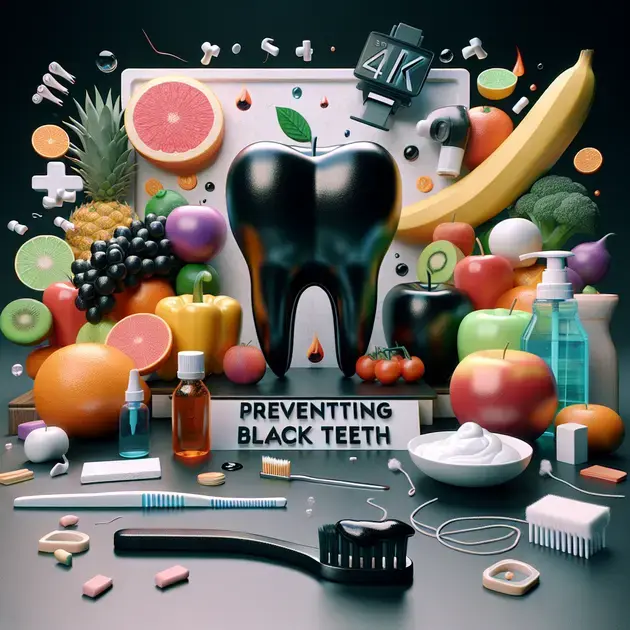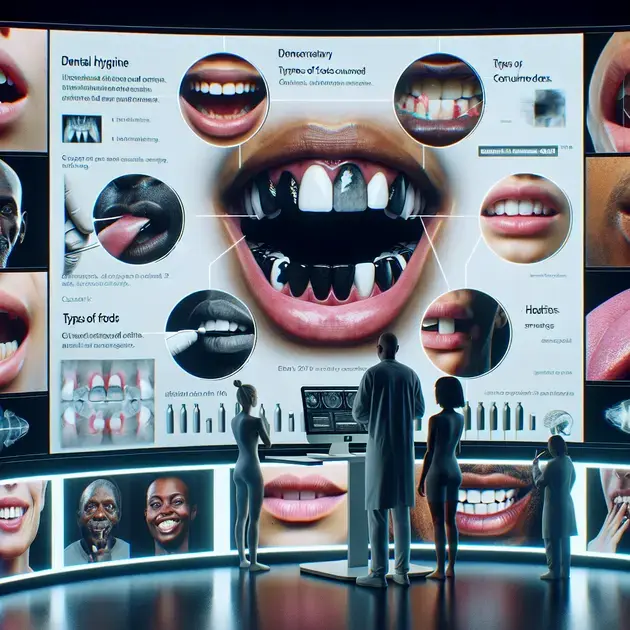Have you ever wondered what causes black teeth and how they can be treated effectively? In this blog post, we will explore the various reasons behind black teeth and the possible treatments available.
From consumption of certain foods and beverages to dental hygiene habits, black teeth can be a result of various factors. Understanding the causes can help in preventing and treating this common dental issue.

Understanding the Factors Behind Black Teeth
Black teeth can be caused by various factors, including poor oral hygiene, certain foods and drinks, smoking, and underlying health issues. Poor oral hygiene, such as infrequent brushing and flossing, can lead to the buildup of plaque and tartar, which can discolor teeth over time. Foods and drinks such as coffee, tea, red wine, and berries contain pigments that can stain teeth. Smoking tobacco products can also cause black or dark stains on teeth due to the tar and nicotine present in cigarettes.
To understand the factors behind black teeth, it is essential to consult with a dentist or oral health professional. They can examine your teeth, review your oral hygiene habits, and discuss any lifestyle factors that may be contributing to the discoloration. Websites like WebMD (www.webmd.com) provide valuable information on the causes of black teeth and the importance of regular dental check-ups.
To prevent black teeth from developing further, it is crucial to maintain good oral hygiene practices, limit consumption of stain-causing foods and drinks, quit smoking, and address any underlying health issues that may be contributing to the discoloration. By addressing these factors, you can help improve the overall health and appearance of your teeth.
Effective Treatments for Black Teeth
There are several effective treatments available for black teeth, depending on the underlying cause of the discoloration. Professional dental cleanings can help remove stubborn plaque and tartar buildup that may be causing black stains on the teeth. Teeth whitening procedures, such as in-office bleaching or at-home whitening kits, can also help lighten dark stains and improve the overall color of the teeth.
In cases where the discoloration is more severe or caused by factors such as tooth decay or infection, dental procedures such as dental crowns, veneers, or root canal therapy may be recommended. These treatments can help restore the health and appearance of the teeth, resulting in a brighter and more confident smile.
It is important to consult with a dentist to determine the most appropriate treatment for your black teeth. Websites like Colgate (www.colgate.com) offer information on different dental treatments for black teeth and the importance of seeking professional dental care for optimal results.
Preventing and Treating Black Teeth
Preventing black teeth starts with adopting good oral hygiene habits, such as brushing and flossing regularly, using fluoride toothpaste, and visiting the dentist for routine cleanings and check-ups. Avoiding or limiting consumption of foods and drinks that can stain teeth, such as coffee, tea, and soda, can also help prevent black teeth from developing.
If you already have black teeth, it is important to seek treatment from a dentist to address the underlying cause of the discoloration. In addition to professional dental cleanings and teeth whitening procedures, practicing good oral hygiene at home can help maintain the results of treatment and prevent further discoloration.
Websites like Healthline (www.healthline.com) offer tips on preventing and treating black teeth, including recommendations for oral care products and lifestyle changes. By taking proactive steps to care for your oral health, you can reduce the risk of developing black teeth and enjoy a healthy, radiant smile.

**Identifying Common Causes of Black Teeth**
Consuming Dark-Colored Foods and Drinks
One of the most common causes of black teeth is consuming dark-colored foods and drinks such as coffee, tea, red wine, and berries. These foods and beverages contain pigments that can stain the teeth over time, leading to a darker appearance. The acidity in these food and drinks can also contribute to enamel erosion, making the teeth more susceptible to staining.
To combat the effects of dark-colored foods and drinks on your teeth, it is essential to limit your intake of these items. You can also rinse your mouth with water after consuming them to help prevent staining. Regular dental cleanings and professional whitening treatments can also help remove stains and brighten your smile.
Additionally, using a straw when drinking dark-colored beverages can help reduce direct contact with your teeth, minimizing the risk of stains. Maintaining good oral hygiene habits, such as brushing and flossing regularly, can also help prevent the buildup of stains on the teeth.
Overall, being mindful of your consumption of dark-colored foods and drinks and taking steps to minimize their effects can help prevent black teeth and keep your smile bright and healthy.
Poor Oral Hygiene Practices
Another common cause of black teeth is poor oral hygiene practices. When plaque and tartar build up on the teeth due to inadequate brushing and flossing, it can lead to discoloration and black spots on the enamel. Poor oral hygiene can also contribute to the development of cavities and gum disease, which can further impact the appearance of the teeth.
To combat the effects of poor oral hygiene on your teeth, it is crucial to maintain a consistent oral care routine. This includes brushing your teeth at least twice a day, flossing daily, and visiting your dentist regularly for check-ups and cleanings. Using fluoride toothpaste and mouthwash can also help strengthen the enamel and prevent decay.
If you have black teeth due to poor oral hygiene, your dentist may recommend professional cleaning or treatments to remove tartar and stains. In severe cases, restorative procedures such as dental fillings or crowns may be necessary to restore the appearance and function of the teeth.
By prioritizing good oral hygiene practices and seeking professional dental care when needed, you can effectively manage and prevent black teeth caused by poor oral hygiene.
Smoking and Tobacco Use
Smoking and tobacco use are significant contributors to black teeth and overall dental discoloration. The chemicals in tobacco products can stain the enamel of the teeth, leading to a darkened or yellowed appearance. Nicotine and tar can also build up on the teeth and gums, causing black spots and contributing to gum disease.
To combat the effects of smoking and tobacco use on your teeth, the most effective solution is to quit these habits altogether. By stopping smoking and avoiding tobacco products, you can prevent further staining and damage to your teeth and gums. Seeking support from healthcare professionals or cessation programs can help you successfully quit smoking.
In addition to quitting smoking, maintaining a thorough oral care routine is essential for removing tobacco stains and preventing further discoloration. Regular visits to the dentist for cleanings and check-ups can also help address any existing issues and keep your teeth and gums healthy.
Overall, quitting smoking and tobacco use is the best way to combat black teeth caused by these habits and improve both your oral health and overall well-being.
Conclusion
Black teeth can be a result of various factors, including consuming dark-colored foods and drinks. Beverages like coffee, tea, red wine, and acidic fruits can stain teeth over time, affecting their appearance. By limiting the intake of such items and practicing rinsing with water after consumption, individuals can mitigate the staining effects. Regular dental cleanings and professional whitening treatments are effective in removing stains and enhancing the smile’s brightness.
Poor oral hygiene practices also contribute significantly to black teeth. The buildup of plaque and tartar due to inadequate brushing and flossing can lead to discoloration and enamel black spots. Maintaining a consistent oral care routine, including brushing at least twice daily, daily flossing, and regular dental check-ups, is essential for preventing such issues. Professional treatments may be necessary to remove tartar and stains effectively.
Furthermore, smoking and tobacco use are major causes of dental discoloration and black teeth. The chemicals in tobacco products can stain enamel, resulting in a darkened appearance. Quitting smoking and avoiding tobacco can prevent further teeth staining and damage. Implementing a thorough oral care routine, along with regular dental visits, is crucial for addressing tobacco stains and maintaining oral health. By quitting smoking and prioritizing oral hygiene, individuals can effectively combat black teeth caused by these harmful habits and enhance their overall well-being.
